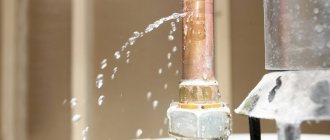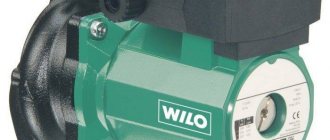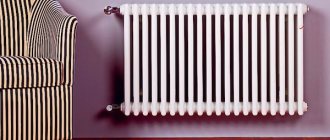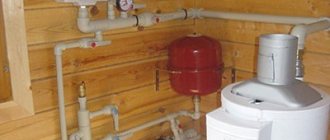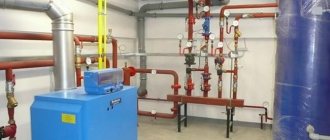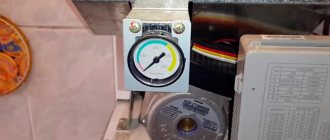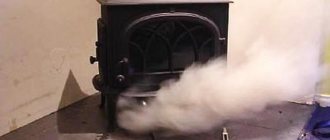Knocking in the heating pipes of a private home is a common occurrence for owners with individual heating. Why the noise occurs and what influences it is necessary to understand.
The main indicator of trouble is poor-quality coolant containing dissolved salts and mechanical impurities.
Why are the batteries buzzing?
Nobody can definitely tell you why the water in the radiators of multi-storey buildings or private households makes noise, making a hum, a whistle or a constant hum. There are a huge number of reasons, but let’s look at the main ones.
If your home's hydraulics are not properly balanced, annoying noises can occur. All houses that are connected to the central heating main are connected to each other. For normal distribution of coolant, balancing valves of different diameters are selected and throttling nuts are installed at the entrance to each house.
When technicians select the wrong nut or adjust the valve incorrectly, the coolant does not reach the top floors and travels through the pipes very quickly. The accelerated circulation causes sounds similar to the hum coming from batteries. Why else can water make noise in radiators? Read on.
When renovation work is carried out on the technical floor of an apartment building, problems may arise. The humming noise can be caused by increasing the number of pipe transitions without balancing the hydraulics or by using smaller diameter pipes. The solution in this case is to call a plumber, who must resolve the issue at a professional level. Each case is individual, but most often the situation is solved by installing a new balancing valve in front of the risers.
If you don't know what causes water noise in batteries, it may be you. For example, you tried to regulate the coolant inlet into the apartment yourself using a balancing valve. This should be done by specialists. To correct the situation, you need to change the adjustment or call a technician who will quickly cope with the task.
Where can I complain?
Normally, pipes and batteries should not make noise. If the sounds are disturbing, you must first contact the house management company with a written complaint. If measures are not taken, you can complain sequentially to the following organizations:
- local body of the State Housing Inspectorate;
- local branch of Rospotrebnadzor;
- local authorities;
- prosecutor's office
If the owner of the living space entrusted the installation of the radiator not to the management company, but to other organizations, he must contact them. Problems may arise if there is no legal act of acceptance of work. In this case, the service of a heating engineer will be paid. In some cases, it is necessary to reconfigure the entire heating system.
If a defect is discovered in the radiator, and the certificate of acceptance of the radiator into operation issued by the organization that installed or replaced it has been preserved, and the warranty period has not yet expired, you can request that this organization carry out diagnostics and free repairs.
Types of extraneous sounds in the heating pipeline
Under the influence of various factors, noise can appear not only in batteries, but also in heating pipes. At the same time, both metal and metal-plastic pipes can sound equally unpleasant.
Extraneous sounds in the heating pipeline may appear:
- Murmuring.
- Rattling.
- Crackling.
- Clicks.
- Gurgling.
- Noise.
- Howling.
- Whistling.
- With a knock.
Often such noises indicate serious problems in the heating system, which require timely diagnosis and elimination.
The pipes howl and hum
The most common type of noise is when pipes suddenly begin to hum, this is especially noticeable at night. The probable cause of the buzzing and howling is a coolant leak. To identify the source of the leak, each apartment is carefully checked for its riser, as well as the basement. In a private house - any room in which a heating radiator and boiler room are installed.
If a malfunction is detected in the operation of the system in an apartment building, residents have the right to complain to the management company or condominium association for repair work. In a private house, repairs to the system are carried out at the expense of the home owner.
Another reason for humming may be the different diameters of the pipes that were used to organize the pipeline. In such a case, the problem area is replaced with a larger diameter pipe.
Clicking, crackling and bubbling in pipes
In most cases, blockage with small particles of debris or sludge leads to cracking and clicking sounds in the pipes. A characteristic sign of clogging is also a dull click.
To ensure that the pipeline stops clicking, the system is thoroughly flushed. To do this, the coolant is completely drained through the drain valve into the sewer, and the pipeline and heating circuit are washed with clean water.
An equally serious cause of cracking and clicking is a broken valve or its incorrect installation. The simplest solution is to install a new device. To prevent a similar problem in the future, it is recommended to use ball valves, which are characterized by increased strength and resistance to blockages.
The pipes gurgle and whistle
Often, when there are air pockets, the pipes whistle, and the coolant in the system begins to make a characteristic murmur. Air can enter the heating circuit and pipes during repairs through leaky connecting elements. In addition to the constant babbling of water, there may be insufficient heating of the heating equipment to maintain the optimal temperature in the room.
The problem is solved by bleeding excess air from the heating system through the Mayevsky tap. The hot coolant is supplied under high pressure, so water is collected in a prepared container in small portions.
Pipes knock and rattle
The cause of knocking in the heating system may be insufficient fixation of fasteners for pipes or radiators. The passage of coolant through the system can cause even slight vibrations, which lead to rattling and knocking. The problem is solved by ensuring rigid fixation of supports for all elements of the system in each individual room.
Sometimes pipes rattle and knock if they are located close to each other. Thermal expansion of metal leads to friction of surfaces that can make unpleasant sounds. To eliminate knocking, it is enough to soundproof the problem section of the pipe.
Other sources of extraneous sounds in the heating pipeline
In addition to violating the installation technology of the heating system, the horizontal pipeline and riser are noisy for the following reasons:
- Water hammer.
- Low quality coolant.
- Noisy operation of pumping equipment.
- Wear or deformation of individual system elements.
- Violation of tightness and permeability.
To identify significant problems, professional diagnostics will be required.
Having figured out the reasons why heating radiators make noise in a multi-story and private house, you can apply simple and effective ways to eliminate them. For example, reduce the pressure in the system, remove air pockets, replace pipes of the required diameter or a thermal valve. Complex cases require an integrated approach to diagnosis and problem solving by experienced specialists.
Murmuring, whistling
When air accumulates, you can hear the water bubbling in the heating pipes - a very common phenomenon. Air can enter the system during repair work, or be sucked in through loose connections - an air lock, regardless of its origin, prevents the normal circulation of the coolant. Not only does the water gurgle annoyingly, but the heating devices do not heat up properly. If an air lock forms that completely blocks the lumen of the pipe, the radiators after the problem section of the pipeline will remain cold.
Air always accumulates at the highest points of the system, since it is lighter than water. This is where special valves or automatic air collectors are usually installed. Radiators located at the end of a horizontal branch must be equipped with a Mayevsky tap. In some types of systems, each heating device has a so-called “air vent”. The units of modern designs can be easily turned by hand; older ones will have to be controlled using an adjustable wrench or a screwdriver.
First of all, you need to try to bleed the air from the radiators of your apartment. The operation begins with the coldest device, if available. Often it is local air pockets that interfere with heating. If this does not give results, then you need to ask your neighbors on the top floor to find the appropriate tap and open it. In difficult situations, it is better to call a qualified plumber. An indicator of success - the release of air - is a characteristic whistle.
Tip: To avoid getting burned, you need to open the Mayevsky tap smoothly, being careful - the hot water in the system is under pressure. In addition, to collect water that will flow from the radiator, it is necessary to first prepare a container of sufficient volume with a wide neck.
*
The principle of operation of heating batteries
Residents of apartment buildings rarely think about the principle on which modern batteries operate. And only with the appearance of specific sounds signaling problems in the heating system does the question become relevant.
The operating principle of the radiator is as follows:
- The heating circuit is filled with coolant - water.
- The coolant moves through the system and ensures heating of all its structural elements.
- A heating radiator easily accumulates thermal energy that it releases into the room.
- The cooled coolant is returned to the common riser and the heating cycle is repeated.
The movement of the coolant begins from the general boiler room or autonomous heating equipment (boiler) through the pipeline to the radiators.
It is not surprising that in a certain area the movement of the coolant may be accompanied by unpleasant noise and hum.
Modern heating batteries are represented by the following designs:
- Tubular radiators.
- Sectional radiators.
- Panel convectors.
- Plate radiators.
Summary of what has been said
Sound phenomena such as crackling, noise and bubbling of water are not so rare during the operation of heating systems. However, this does not mean that you have to put up with it. On the contrary, the slightest extraneous sounds should alert you. Methods for eliminating noise will depend on the cause found. If you cannot independently determine the cause of knocking or other noise, then it is better to call a team of specialists who will not only determine its true source, but also eliminate the cause. If measures to eliminate noise are not taken in time, the consequences can be quite disastrous - even serious accidents.
How to solve noise problems
It often happens that the heating device becomes clogged from the inside. In this case, pieces of slag will move along the radiator along with the flow of water, touching the walls.
In this case, flushing will help. A hose is put on the faucet, and the water along with the debris is gradually drained.
Video:
If the procedure does not help, at the end of the heating season the radiator will have to be dismantled, disassembled and cleaned, or replaced.
An air lock in a heating device is a common cause of unpleasant gurgling sounds.
This problem is solved with the help of a Mayevsky crane, which will allow the air to be released and the battery to continue to operate silently.
Quite often, at the beginning of the heating season, problems with noise in pipes can arise due to pressure that is not fully equalized.
When the pressure difference in the pipeline exceeds 1.5 atmospheres, tapping may begin.
In this case, the specialist must install a washer in front of the regulator nozzle, which will equalize the pressure.
In an apartment building, a circulation pump is responsible for the movement of warm water through pipes and heating appliances in apartments.
If for some reason it starts to work incorrectly, then specialists must determine the solution: it may be necessary to install a special valve that will correct the operation of the pump, or it may even go as far as replacing the unit.
If the cause of the noise is identified in the place where the heating battery connects to the bracket, then you should think about replacing the brackets or choose a simpler method - place a rubber pad between the battery and the fastening element to prevent friction.
You can identify the leak yourself. To do this, just inspect the pipes in your apartment or house. If one can be seen with the naked eye, then this is good luck, and corrective measures can be taken immediately.
Having found out that everything is normal in the apartment, you need to go around the neighbors to look for the pipe from which water is leaking.
Video:
If your neighbors also do not find a leaking pipe, then it is necessary to inspect the main unit of the heating system.
In an apartment building, it is located in the basement, going down into which you can immediately come across steam - it is this that signals the location of the breakthrough.
In this case, the emergency service is immediately called.
As it turned out, there are various reasons for the unpleasant sounds emanating from radiators. But it will be easier to find out the reason now.
In most cases, it is better to solve the problem of eliminating noise according to the opinion of specialists, because they are guaranteed to have experience, knowledge, special tools and spare parts.
The main thing is not to hesitate, because this will help to avoid emergency situations in the future.
Batteries click, shoot, knock
If a thermostat (thermal valve) is installed in the heating system, this may be the reason. Check if it is positioned correctly. On its body there should be an indicator of the direction of water or coolant flow (see photo). The only option to get rid of the knocking noise in the battery is to remove it and put it in the right direction.
Don't be lazy! Check right now whether the regulators in your apartment or house are installed correctly: -8
Thermostat with flow direction indicator
Sometimes pipes may knock. This happens when they are located too close to a wall or furniture. Due to strong pressure, the heating system may begin to vibrate. Moreover, this is not always noticeable to the eye. You can solve the problem by wrapping the pipe in insulation or a thin piece of rubber.
Methods for finding a faulty tap
To identify an apartment with faulty taps, you need to turn them off one by one from the hot and cold water pipes and listen to whether the unpleasant sound has disappeared or not. As soon as the hum in the pipes stopped, an apartment with faulty plumbing was found.
If you checked each of the apartments in the house using the method described above, and the problem was not solved, it is likely that the sound is caused by the installation of a valve blocking the riser. You can test this hypothesis by turning off the taps supplying water to this riser. If the sound disappears, then the problem lies with the riser valve.
Remember also that if you have a branched water supply system in your basement, containing many valves and valves, any shut-off valves can cause a hum. In this case, determining the cause of unpleasant sounds without an experienced plumber can be very difficult and not as quickly as we would like.
If the cause was still localized, consider yourself lucky. With simple repairs it can be easily eliminated.
Clicking or knocking noises when heating and cooling
Sometimes strange noises occur when batteries start to heat up or cool down. This is due to the fact that they do it unevenly. Metal expands when heated and contracts when cooled.
In this case, you need to lay gaskets between the brackets on which the battery is attached to the wall or floor and the radiator itself. These can be ordinary pieces of rubber 2-3 mm thick.
Important!
If you have cheap bimetallic radiators, extraneous sounds may arise due to their internal structure. The design of bimetallic radiators differs from others - they use two metals. If they do not fit tightly together, clicks will be heard when expanding.
Causes of noise in batteries
To determine the reasons why batteries are noisy, it is recommended to check the external condition of the devices. If there are no visual defects or damage to the housing, it is necessary to determine the type of extraneous sounds. Often the sound effect is created when water hisses and makes noise, clogged pipes click and hum, or the radiator housing knocks. This is influenced by the following factors:
- Mismatch in diameter of water pipes. Often the heating system consists of pipes of different diameters, which can cause unpleasant knocking and noise in the battery when the coolant moves. The problem is solved by replacing pipes of the same diameter.
- Pressure surges within the system. To reduce the maximum pressure in an apartment building, a special washer is mounted in front of the incoming elevator pipe or a pressure regulator is installed.
- The appearance of air pockets in the pipeline and heating devices. This causes the coolant to gurgle in the batteries. Residents of a multi-storey or private building can hear a similar sound at the beginning of the heating season when the system is filled with hot coolant. Removal of traffic jams is carried out by draining the water using a Mayevsky tap.
- Incorrect thermostat installation. Sometimes noise in radiators can occur as a result of incorrect connection of the thermostatic valve. In some cases, batteries crack when the thermostats are installed and not adjusted by neighbors in the riser. To solve the problem, it is enough to check the correct installation and settings of the valve in your own and your neighbor’s home.
- Displacement of the heating battery. When the coolant heats up, the heating circuit can expand, which leads to involuntary friction of surfaces. If the heating battery clicks, this problem can be eliminated by installing a rubber gasket between the fixing elements and the batteries.
- Modern multi-storey and private houses are equipped with a circulation pump, the vibration of which reaches the heating circuit. To reduce the noise during pump operation, it is recommended to install a special inlet valve on the elevator.
- Heating circuit clogged. If the battery crackles and hisses, this may be due to the entry of small particles of debris with the coolant into the system when the heating main breaks. To remove the unpleasant consequences of blockages, a complete flushing of the heating system is required.
- Sudden temperature changes when heating the coolant. If the heating circuit is filled with hot coolant and then cool, a characteristic sound may occur due to the clicking of the battery housing. This occurs as a result of thermal expansion of the metal.
How to remove an air lock with your own hands
Air in the system after a long stop is common. This problem arises not only in the private sector, but also in apartment buildings. It's quite easy to solve.
Heating radiators are equipped with Mayevsky taps located at the ends of the radiators. This could be a valve or a fitting with a notch for a screwdriver.
How to fix:
- armed with a small container (for draining water), you need to unscrew the tap and let out the air;
- Actions should be performed carefully so as not to get burned by the escaping steam;
- when water comes out of the hole, close the valve;
- Such manipulations are carried out on each battery.
This eliminates noise and allows the coolant to move freely through the system, evenly releasing heat.
How to remove the gurgling and noise of water in batteries
What to do when the noise from the batteries sounds like gurgling and gurgling? There is only one answer in this case - it is an air lock. Air entering the system in different ways causes unpleasant sounds that irritate the owners of an apartment or private house. The reasons causing this include:
- incorrect filling of the heating system with water initially;
- broken pipeline tightness;
- filling the system with untreated water.
In each case, the solution is to bleed the air - the system needs to be de-aired. For this purpose, there are Mayevsky taps, which are opened with a screwdriver or a special key. First, air comes out of the hole, then bubbles. You need to wait for an even stream without interruptions - in this case there is no air in the system.
Water hammer as a cause of pipe humming
If unpleasant clicking sounds occur in the heating pipes of a private home, a possible cause may be water hammer. The physical basis of this phenomenon is explained by the impossibility of immediately stopping the movement of water due to its inertia. Control of the coolant flow depending on the temperature in the heating network is carried out by regulators.
Water hammer and water noise in heating pipes occurs at the moment when the water is completely shut off. It is practically incompressible and cannot immediately extinguish the energy of inertia. At the point where the flow suddenly stops, the pressure can reach tens of atmospheres. In addition to the fact that communications hum and knock, water hammer can cause more serious problems, for example, destruction of threaded connections, valve parts, etc.
A loud noise associated with water hammer may also be heard in the underfloor heating system.
The length of the pipeline affects the force of the water hammer. It is strongest in a heated floor system that has a significant duration. Water hammer is also dangerous if the thermostat is installed at the outlet of the heating circuit. If a thermostatic valve is placed at the inlet, the maximum possible pressure drop is less than 1 atm. Since, according to standards, the heating network must withstand short-term pressure surges of up to 4 atm, cracking and knocking is unlikely.
Noises in the heating pipe
There are also two reasons for noise in a heating pipe - a narrowing of the pipe, which turns into an obstacle to the flow of water, and a leak in the heating system. It is clear that detecting a leak is not difficult. But with the first reason you will have to tinker. It is logical that a narrowing in the riser of the heating system will result in a lower radiator temperature for you than for your neighbors. An obstruction to the flow of hot water can be a screw valve with a faulty valve, a half-open valve, or a piece of scale or slag stuck somewhere across the pipe. It’s easy to deal with a half-open valve yourself, but other issues require the intervention of the management company.
Battery cleaning scheme
Noises in the heating system in the form of knocking can also occur in radiators. There are three reasons for this - thermal expansion at variable radiator temperatures, a broken valve valve, or small particles in the water flow.
I found the source of the noise in the heating pipes!
Let's start small, with the smallest particles of slag, which, when knocked against the walls of the pipe, create extraneous noise. You can try to remove them by flushing the heating system. If there is a flush tap, you can do this yourself; if not, then it is better to call a plumber.
A broken valve is a common problem with all screw valves. Moreover, a damaged valve can completely block the flow of hot water, leaving some apartments without heat. And in the best case, with a slight misalignment, it can chaotically change its position, causing looseness, and from time to time block the lumen of the pipe, thereby causing water hammer. In these cases, the management company must immediately repair the heating system by replacing the damaged valve.
Screw valve
But the neighbor doesn’t know...
And finally, the third reason why pipes in the heating system hum is from a knock in the radiator, which is mounted on steel supports and is located, as a rule, under the window, which we often open to ventilate the room. Opened it - the radiator temperature dropped. They closed it and it went up again.
So, at the slightest movement of the device, as a result of slow expansion and contraction of the metal, creaks will appear, similar to rare tapping. To eliminate them, it will be enough to lay a fluoroplastic plate between the steel support and the contacting surfaces of the heating radiator.
I would like to remind you that noise in water supply and heating systems is only part of the tones in the polyphonic sound palette of a trumpet “symphony”, but we have considered the main ones.
It's good if you don't have to call a plumber about humming in the pipes
On this hopefully optimistic note, I want to end this article about the repair of heating and plumbing systems. I think that after this, everyone can figure out why the pipes are humming and fix the problem with their own golden hands, or with the hands of management companies. Finally, I have a question for you: “Are your upstairs neighbors bothering you with their noise?” Why did I ask this? It’s just that in the next article we’ll look at how to protect yourself from noise from above.
Incorrectly installed valve or thermostat
Characteristic sounds: knocking, whistling.
An incorrectly installed valve or thermostat can cause noise in the batteries. The valve only works correctly in one direction. If the technician has mixed up the connections, water will flow from the top of the valve, and not from the bottom, as it should be according to the instructions.
Sectional view of a standard thermostat for a heating system.
The liquid, pressing on the valve, periodically narrows the gap. Sometimes it dangles in the coolant, blocking movement. As a result, a water hammer is created due to a short-term increase in pressure.
Incorrectly installed devices must be replaced or reinstalled.
Noise from heating pumps
Constant noise in the heating pump may appear due to partial breakdown of its components - the impeller or rotor. At the same time, the functioning of the entire system deteriorates, which leads to a decrease in its efficiency. To eliminate this reason, the pump should be repaired or a new one installed.
Also, constant noise in the circulation pump can be caused by its unstable operation. Voltage drops lead to loss of synchronization and, as a result, uneven movement of the coolant. This can cause noise in the heating system in other areas - in pipes and radiators. The operation of the pump can only be checked after a complete diagnosis. It is impossible to do it at home without special equipment.
In addition, noise effects in the riser or other areas of the heating supply may occur due to pump malfunction for the following reasons:
- Incorrect installation
. The rotor of the device must be strictly horizontal; - Inconsistency of equipment power with calculated data
. This leads to a significant increase in the rate of coolant flow through the lines. The only way out is to install a pump of appropriate power.
In practice, it is extremely difficult to diagnose noise in a heating circulation pump. To do this, it is necessary to dismantle it and disassemble the structure. This can only be done with special skills and diagnostic tools. Therefore, this work is best left to professional repairmen.
What to do first, where to go
If a person uses an individual system and understands the issues of repairing heating equipment himself, he does not need to complain anywhere. The heating system is his property, and he can repair it himself by examining the possible problems described below. In cases where the home owner does not have plumbing skills, he will have to call a specialist and pay for the work. It is not difficult to find it through advertising on the Internet or recommendations from friends and relatives.
It's another matter if a person uses central heating. If a resident of an apartment building experiences noise from the radiators, the first thing they should do is call the management company. You can find out the phone number of the management company from your neighbors by studying the information on the walls of the entrance, in receipts, in the contract for the provision of services (for example, intercom service) or in online directories (for example, reformagkh.ru).
If the organization does not respond to calls, you must personally contact the Criminal Code with a statement. If the resident has a document confirming acceptance of the system, the company’s specialists must conduct a free noise diagnosis.
According to current standards, the noise level during the day should be up to 40 dB with the possibility of increasing by 15 units. At night, noise should not exceed 30 dB.
If the problem is not resolved, you need to file a complaint with the housing inspector. If the issue is resolved negatively, all that remains is to contact the prosecutor's office or court. Failure to comply with responsibilities to correct tenant problems is a violation of the law. The facts of the tenant’s appeal to the relevant housing and communal authorities will assist in the consideration of the case.
And the neighbors are noisy too
More often than not, it's not just you and your family who suffer this. Therefore, you first need to go around the neighbors along the riser to identify the location of the noise.
Let's find out where the pipes are making noise
Now, as for the nature of the buzz. Heating pipes, like water pipes, can emit single or rhythmic sounds, something like tap dancing, rustling, gurgling, or even generally vibrate and even hum – periodically or constantly. The reasons can be completely different, they are even classified into groups. But now we will not consider absolutely all of them, but will focus only on impact noise effects.
Note: The likelihood of noise in pipes is sharply reduced if you use metal-plastic or plastic pipes instead of metal and copper. This is explained by the high sensitivity of steel pipes to low-frequency vibrations and high rigidity. Although their material is much stronger. It is recommended to use ball valves rather than screw valves as shut-off valves, which are controlled by turning the handle. These are heavy cast copper products, not Chinese-made products made from light alloy material.
Murmuring, rustling. Gurgling, sound of pouring water
When such sounds appear, the reasons may be the following:
- The appearance of an air lock;
- Debris in the heating system;
- Bad gaskets.
Airing of the heating system is the most common problem with the appearance of extraneous sounds in the system. Air may appear due to poor quality water or coolant. This is especially true for aluminum radiators. Water with high acidity and alkalinity reacts with the metal and releases gas, which creates a plug.
The second reason for the appearance of air is poor-quality coolant. Over time, it can begin to break down and release oxygen or other gases (sometimes harmful to health).
It is not difficult to detect an air lock in the radiator. It is enough to touch it with your hand from above and below. If the top part of the battery is less heated, air or gas has accumulated there.
If a Mayevsky valve is installed on the batteries, bleed the air from each individual radiator. After that, wait 15-20 minutes and repeat the process. If there is no Mayevsky crane, the process will become more complicated. Read more about this in the article “How to properly bleed air from a heating battery with your own hands.”
Debris in batteries can appear for several reasons:
- Poorly purified water in the heating system;
- Decomposition of the coolant with the release of solid particles;
- Corrosion of the internal walls of radiators;
Small particles of rust and sand rub and hit the inner walls of the batteries, as a result of which an extraneous sound appears, such as rustling or rustling. The only way out is to flush the heating radiators.
How to avoid noise
It is important to turn off the gas before making any repairs. If you suddenly feel that you smell gas, immediately turn off the tap at the entrance to the house, turn off electrical appliances, ventilate and call the gas service
During installation, you can install an elastic vibration-absorbing layer under the casing in all places where the boiler comes into contact with the wall.
Boiler cleaning
First of all, it is important to carry out regular maintenance of heating equipment, which includes cleaning components, removing dust and lubricating some elements. This will increase the lifespan of your boiler and eliminate noise before it even occurs.
In a closed system, you need to add water from time to time, monitoring the pressure gauge. In some devices, for example, Visman Vitopend, it is displayed on the control panel at the bottom of the case.
Let's figure out what to do when the device is already making strange sounds:
If the cause is oxygen saturation of the water, the problem can be solved by converting the open system to a closed one. To do this, air vents are installed on the water heating boiler and the expansion tank is replaced with a membrane one. The fan should be inspected and cleaned
It is important to note that the main blades are located inside the housing under the casing. After cleaning the dust and dirt, additionally lubricate its bearings
If this does not help, the cooler needs to be replaced. When the heat exchanger howls, you need to clean the scale inside it. In order to remove it, the casing is removed and the pipes connected to it are unscrewed. It is best to pour a special anti-scale chemical inside, which is sold in hardware stores, and leave it for several hours. If removing the heat exchanger is too difficult, the product is poured inside using a flexible hose. If the gas valve whistles, you need to check its settings. The correct configuration is written in the operating instructions. When the pump power exceeds the need of the system, it is necessary to reduce its speed by changing the position of the white switch under the cover on the terminal block. Air from the heating system is discharged through a brass air vent on the front panel of the device. If there is a popping noise when igniting on semi-automatic models with piezo ignition, such as Bosch W, clean the nozzle and pilot tube that the starter ignites from dust and clogging. When an automatic boiler, for example Ariston Genius, turns on with a loud bang, you should clean the ignition electrodes and, if necessary, adjust their location. After this, the fire will proceed quietly. Noise from valves can be prevented by replacing them with ball valves or installing an additional rubber gasket. To get rid of the fact that the gas meter is clicking, you need to call the gas service to check it. Most likely, you will have to replace the device. In order to eliminate metallic knocking when the temperature of the radiators changes, you should move the wall mounts to places that coincide with their support points. Putting rubber gaskets on the brackets also solves the problem. When heating pipes built into the wall ring, you need to lay a special insulating material called Merelon around them. It is advisable to think about this at the time of installation, so as not to spoil the repair later.
If it is difficult to localize the sound, let the boiler operate in different modes. For example, if you have a double-circuit device, for example Ferroli Atlas, and you don’t understand what and why it’s humming, turn off the hot water supply. Next, note at what time interval the extraneous sound appears, when the boiler is just starting up or at high temperatures, after it overheats.
Methods for cleaning radiators from dirt
During operation of the heating system, dirt accumulates in it: iron oxides, dissolved salts and possible mechanical impurities. But if water moves through the pipes at high speed, then in the radiators the process slows down and the sedimentation of suspended matter increases. Therefore, cleaning radiators is a must.
There are two methods: flushing the entire system together and disconnecting the batteries and cleaning using a compressor unit. Favorable conditions are created in the batteries for the accumulation of dirt, since the coolant slows down the movement in them. To flush, the radiator is connected to the compressor, and dirt is cleaned from it with water pressure.
If you carry out annual preventive maintenance of the entire system, then drastic measures will not be required. It is quite possible to limit yourself to a general flushing of the entire heating circuit with ordinary water. Chemical reagents are used in cases where the coolant does not meet the established parameters and significant deposits of salts and scale appear on the working elements.
After using chemicals, leaks may form in radiators and cracks may appear that were successfully covered with dirt.
To avoid an emergency, all equipment must be checked for functionality before starting the system.
Timely preventive maintenance of all components of the heating system will protect it from complex accidents and save the budget.
The batteries are humming
The reason why heating radiators in a private house or apartment began to gurgle is due to unevenness of the pipes and different cross-sectional diameters. This is due to the fact that water circulating along irregularities and bends encounters obstacles and flows around them. Violation of the fluid permeability indicator provokes the occurrence of gurgling.
Cleaning and washing batteries
In this case, in order to understand why the heating radiators are noisy, you need to get rid of the blockage and check whether the valves are closed and not damaged. If everything is fine with them, use two methods:
- Cleaning with strong water pressure.
- Using special chemicals that corrode the garbage. Then it is washed using the first method.
In cases where the blockage has occurred in large quantities and has formed a plug, the help of a welder may be required to clear the debris. Advice. When designing shut-off valves, take into account the possibility of debris ingress and abandon the valve option. Use ball valves only. They are much easier to use and have good wear resistance.
An increased degree of wear and tear of the heating pipes in the apartment also contributes to the appearance of extraneous sounds in the heating system. Check it annually. If it has been determined that the sound comes specifically from the heating radiator, it is necessary to check its condition, and it is better to entrust its replacement to a specialist.
Some preventative advice from experts
To ensure free circulation of coolant, the heating system must be flushed before connecting. Over 6-7 years of work, plaque up to 7 mm thick accumulates. This reduces equipment efficiency by 30%. Many people mistakenly believe that plastic pipes are not covered with plaque.
The owners are responsible for flushing systems in private homes. They should remember that aluminum equipment should not be washed with chemicals. This event in multi-storey buildings is carried out by responsible organizations.
When installing a heating system, it is strongly recommended to install Mayevsky taps or purchase radiators with them. It is preferable to use taps instead of valves. The coolant should not be changed frequently. It is necessary to maintain the water level in the expansion tanks. The system should be carefully inspected for any deficiencies and pressure tested.
Why does “humming” occur in the water supply system?
We will consider the reason based on physical knowledge. The main reason is sound waves due to vibration. Its cause may be:
Very high pressure in the pipeline
The sound will be heard not only by the entire entrance, but also by the house. The pipeline may have been damaged in a hard-to-reach place. The result can be costly repairs for you and your neighbors.
Metal pipeline wear
The faucet hums when the tap is turned off due to the accumulation of lime and other deposits on the walls of the pipes, as well as rust. This can also be the cause of vibration and humming when the water is turned on.
Incorrect pipe connection during installation
A common cause of unpleasant sound. Therefore, if the water tap is humming, it is necessary to check all connections between pipes and system elements.
The most obvious problem, due to which the faucet not only begins to “buzz”, but also leaks in addition.
We find out and eliminate the defect
Before installing a water supply system, we recommend that you make the correct calculation of the diameter and material of the pipes, in accordance with the pressure in it. When installing gaskets in a faucet, you need to choose only high-quality materials from reliable companies. The installation of the system should be carried out professionally and efficiently.
Alas, this does not happen as often as we would like, so you will have to make your own adjustments as the operation progresses:
- A radical solution to the problem - replacing all the old pipes in the apartment with new ones - may not bring the desired result. This is due to the fact that it is necessary to change the entire pipeline in the entrance or house.
- A less radical way to deal with a humming faucet is to clean the pipes from accumulated deposits. The method is definitely effective, but you will have to clean the pipes periodically.
Tip: to determine excessive water pressure in the system, you need to open the mixer and then close it immediately. If after the tap is closed you hear a hum, then this is the reason.
The faster the sound appears, the higher the pressure in the pipe, and the volume indicates that the permissible limit has been exceeded. In this case, we recommend installing a special air chamber in front of the mixer to absorb sudden pressure surges in the system.
Air chamber for noise reduction
Installation can be carried out using:
- additional pipe section;
- special muffler for the crane. The devices are manufactured industrially and are equipped with a built-in chamber to suppress sudden pressure drops.
If vibration and humming occurs due to loose installation of system elements, seal them with improvised means. As a result, the various turbulence in the flowing water will disappear, and the mixer will stop humming.
Pipes hum when the tap is opened - check the tap axle box
Faucet repair
Now let's talk about the main reason for the “buzzing” of the mixer - the faucet-axle gasket, which may be incorrectly installed, defective or worn out. In the vast majority of cases, it is this that causes the sounds in the system when the tap is opened and its leakage.
Let's look at the problem in more detail:
- Determine which tap produces an unpleasant sound when you open it, hot or cold.
- Shut off the corresponding supply with your own hands.
- Dismantle the crane axle box on which the gaskets we need are located. The faucet is a device necessary for regulating the water supply. Usually located under the valve.
In the photo - replacing the gasket
- Replace worn gaskets, their price is very low, so choose the best ones. Rubber or ceramic products can be used. To find out which ones you have installed without disassembling the faucet, open it. If you need to make one revolution, a ceramic gasket is installed, several - a rubber one.
Repairing a faucet with a rubber gasket
- Remove the crane axle box.
- Take a sharp knife and cut the edge of the gasket at approximately a 45˚ angle.
Tip: keep in mind that the cutting depth should be no more than 1 mm.
- If you see that the gasket has already worn out completely, then it is better to replace it immediately.
- Reassemble the faucet after all manipulations with the gasket.
- Turn on the water and check the device for leaks and humming.
If you don’t know what to do if your hot water tap is humming, disassemble the device and check its parts
Advice: The most likely cause of leakage and “humming” of a faucet with an installed ceramic-based faucet axle is a sagging silicone washer, which is needed to press the ceramic parts of the element together.
We recommend covering the silicone ring with plastic after disassembly. Usually the problem of leakage and unpleasant sounds is eliminated.
The gasket is worn out - that's why the faucet is humming
The measures suggested above are temporary. Therefore, you need to rush to the store and replace the failed crane axle box.
Troubleshooting Methods
In a centralized heating system, only employees of the operating company can eliminate the problem of hum in the riser. You can submit an application by writing an application and submitting it to representatives of the service company.
If there is noise from the autonomous heat supply batteries, you must contact a heating engineer to diagnose the system and troubleshoot the problem.
Having identified errors made during installation, the technicians will be able to localize the cause and eliminate the defects, but for an additional fee.
You can try to localize the cause of the appearance of characteristic sounds yourself. To do this, follow this technique:
- Observe the frequency of sound occurrence.
- Try to determine the dependence (pressure surges in the system, temperature increases).
- With independent heating, where the boiler may be the suspected culprit, make sure that the noise comes from the unit itself and not from elements associated with it.
Diagnosis of fastening elements is carried out through tactile perception. If, in addition to noise, you feel strong vibration, install additional fasteners.
To get rid of the air lock, stop the autonomous heating supply. When the temperature drops to +25-30°C, open the Mayevsky tap slightly, waiting until the system gradually fills. The air pocket will disappear after 1-2 minutes, leaving the pipe along with the coolant. After that, start the system and listen: if the cause is eliminated, the effect will no longer occur.
This process is clearly shown in the video:
Having determined that the cause of the noise is the system being clogged with debris, you can eliminate the problem by cleaning it. To do this, you should first check the condition of the mesh filter, and then clean the system itself using one of two methods:
- Chemical - involves treating the internal walls of the equipment using special reagents that decompose the blockage into small fractions. After this, the remaining debris dissolved in water is easily washed away from the mains.
- Hydrodynamic - limescale and debris are removed from the battery and pipes under the influence of strong water pressure.
Often the source of noise is faulty components of the heating system, for example, a drain valve or an air vent. In such a situation, it is necessary to replace them and reinstall them.
If the problem is the pressure drop in the circuit, you can solve the problem by installing a regulator or a special washer in front of the elevator nozzle, which can be purchased at plumbing supply stores
The characteristic clicks that occur when the metal elements of the line move involuntarily when heated are quite easy to remove. It is enough just to place rubber gaskets between the battery and its mount.
If the difference in pipe cross-sections is not taken into account during installation, noise can be eliminated by balancing the cross-sectional diameters of the water supply elements. This will allow the liquid to circulate freely throughout the system.
If the cause of the noise is improper operation of the boiler or pump, the issue should be approached comprehensively. It is necessary to check the operation of the units through a complete diagnosis, which is almost impossible to carry out at home without the use of special equipment. It is better to entrust this work to professional repairmen.
Noise Elimination Solutions
A set of simple measures will help you get rid of some sounds. There is no need to invest serious financial resources or physical effort. The choice of method for eliminating noise depends on its nature. The symptoms described will help solve the problem and get rid of annoying sounds of any origin.
Noise in heating pipes
The dull monotonous noise of the riser is accompanied by slight vibration in the batteries. The cause of the problem is a simple water leak. The damaged area can be detected visually or by ear. A vapor cloud forms at the leakage points and a slight hissing or hissing sound is heard. The cause of the leak may be an insufficiently closed air release valve. Often damaged areas are hidden under a layer of insulation or in the space of concrete floors. It is difficult to detect them in such cases. Basement leaks create noise throughout your home.
Another reason for a hum is clogged pipes. Over time, a layer of scale and rust forms on the internal walls. The diameter of the elements decreases and the pressure increases. As a result, noise is generated in the heating radiators. You can flush the system yourself; you should take care of this before the start of the heating season. A flush tap is installed on the radiators, through which (using a hose) hot water is drained into the toilet. The procedure is performed until clear liquid flows from the hose. Sometimes such actions are enough to stop the hum, clicking and crackling.
Attention! When draining boiling water from heating, you need to take precautions. Water above 90°C can cause harm to health and crack ceramics
The described method will help to partially get rid of garbage. Hydropneumatic heating flushing or the use of chemical reagents will help return the pipes to their original properties.
The reason for the hum is the taps responsible for regulating the flow of heating fluid. Shut-off equipment is installed directly in front of the radiators or at other points preceding the radiators. Excessive blockage of water flow obstructs normal circulation. Under pressure, the heating fluid hums, whistles, etc. Correct adjustment of the taps will help prevent this phenomenon.
Wear and wear of internal parts of shut-off equipment leads to vibration. Resonance of parts creates an unpleasant hum. The solution to the problem is to repair or replace the taps. The elevator unit of the heating system, which is located in the basement, is noisy as a result of unprofessional intervention. To increase the amount of coolant, residents themselves remove the washer, which is responsible for the speed of water flow.
Insulation for radiators is rarely used in Russia
Incorrect burner installation
Quite often, a noise resembling tapping or whistling can be caused by the fact that the gas burner in the boiler was initially incorrectly configured and installed. To check, you will need to compare the level of gas pressure leaving the burner and the recommended indicators in the technical data sheet of the equipment. Entrust this task to the specialist who installed the gas boiler.
What types of noise can pipelines make?
The sounds emanating from heating system elements are legendary. Under certain circumstances, not only heating pipes make noise in the house, but also other pipelines. At the same time, the sound range of all sanitary systems is approximately the same. The most “musical” ones are metal pipes, but they also play unusual melodies. A water heating system can make a wide variety of sounds:
- murmur;
- gurgling;
- rattling;
- knock;
- crack;
- clicks;
- hum;
- whistling;
- howl.
Specific sounds signal the presence of problems in the heating system, so it is necessary to quickly identify and eliminate the source of the noise, since systematic exposure to it on a person leads to disorders of the nervous system, interferes with sleep and reduces performance. Why is water noisy in heating pipes
Noise in heating pipes is caused by the following reasons:
- air jams;
- high speed of coolant movement due to incorrectly selected pipeline diameter or a decrease in the internal lumen of the pipe due to overgrowing of its walls;
- coolant leakage in emergency areas or through poorly closed valves;
- scale peeled off from the pipe walls or debris that got into the circuit during installation;
- faulty or incorrectly installed valves;
- excessive pump power or improper installation;
- wear of control valves or thermostatic heads;
- cavitation - the formation of steam bubbles in the coolant in the area of a sharp increase in the diameter of the pipeline (the appearance of an area of low pressure) with their subsequent collapse, destroying the equipment;
- violations of installation technology (use of polypropylene pipes with a diameter smaller than the calculated one, failure to observe the minimum distance between parallel sections of a metal pipeline during installation, installation of a filter or valve not in the flow direction indicated on it, etc.).
Methods for neutralizing noise
The source of noise often turns out to be in the locations of public utilities. The coolant pressure at the heating main entry point is the highest, so the slightest malfunction in it can immediately manifest itself in the form of strange sounds throughout the entire entrance. In a private house, the noisiest place is the furnace or heat generator room, where the boiler and its entire piping system are located.
If the problem turns out to be a malfunction of collectively owned equipment, then you should not fix it yourself. Worn-out components can literally crumble at the slightest attempt to unwind them, and all the blame will be placed on the one who unauthorizedly interfered with the operation of the “perfectly debugged” system. It is better to send a complaint to the service organization and patiently wait for their representative to repair the faulty components.
A visual reminder with the coordinates of addressees if it is necessary to contact housing and communal services issues
The trumpets sing at night
Often the water pipes hum in the apartment at night, but during the day the system works quietly. The reason is simple – someone’s faucet is leaking. This most often happens with old models or incorrectly installed faucets.
The fact is that at night the water pressure increases significantly, since no one uses it. Because of this, cavitation occurs in a small leak between the gasket and the faucet wall. Because of it, noise arises, which is transmitted along the riser.
There are four options to resolve the issue:
- Replacing the old gasket;
- Installation of a new mixer with a high-quality ball mechanism;
- Installing a flexible hose between the mixer and the pipe;
- Replacing the mechanism in an old mixer.
The only problem is that it will be difficult to find the culprit. Not everyone admits that they are the cause of the inconvenience their neighbors experience.
